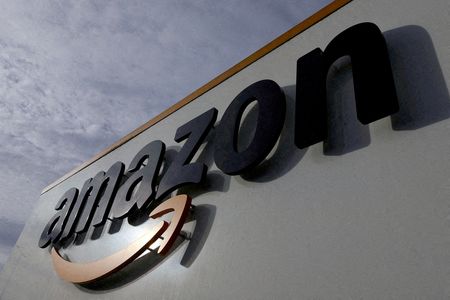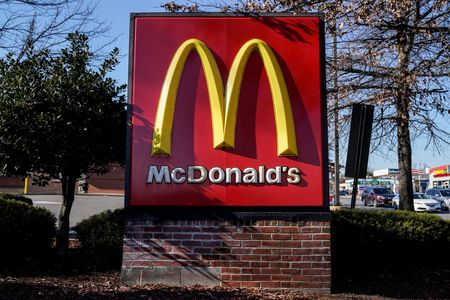By Ananya Mariam Rajesh and Aishwarya Venugopal
(Reuters) – In a strong quarter for earnings, the big consumer stocks have shone even brighter, thanks to results from McDonald’s, Chipotle Mexican Grill and others that rank among the biggest surprises of the reporting cycle so far.
Roughly half of the S&P 500 companies have reported results thus far, with more than 77% exceeding results. But of that group, consumer discretionary companies have been the biggest surprise, on average exceeding earnings-per-share estimates by 19%, according to LSEG I/B/E/S data.
Consumer-facing companies have benefited from maintaining higher selling prices and a steady drop-off in raw material costs that have helped boost profit margins.
Discretionary stocks have performed strongly in 2023, proving their resilience at a time when the expectations of a U.S. economic slowdown run high. A 4.9% rise in U.S. gross domestic product in the third quarter further highlights the health of the consumer.
Including Monday’s gains, the S&P 500 consumer discretionary index is up nearly 19% this year, far outperforming the broader S&P 500, which is up nearly 8%.
“The results suggest that investors continue to see the sector as a ballast in uncertain times, which we believe is supported by generally sound fundamentals underlying the health of the U.S. consumer,” said Jason Benowitz, CI Roosevelt senior portfolio manager.
McDonald’s benefited from falling wholesale costs, as its per-share earnings came in at an adjusted $3.19, compared with consensus estimates for $3 a share. The company said falling costs of commodities like vegetables and proteins helped margins.
On the whole, 251 S&P 500 companies have reported results, with 77.7% coming in above analyst expectations, compared with an average of 67% in a typical quarter, according to LSEG data.
Among the other consumer discretionary names that have surpassed expectations are Amazon, Hilton Worldwide Holdings and Royal Caribbean.
“(What) we’re noticing about people making higher wages and as wages go up, they’re spending almost all of that increase,” said Brian Mulberry, client portfolio manager at Zacks Investment Management. “That would reflect for us a pretty high level of confidence from the consumer.”
While most companies flagged the resilience of consumer demand, some analysts also said expectations were low heading into the third quarter as the side effects of still-high inflation lingered.
“I don’t think consumer spending drove these beats. I think it was more pricing and a resilient consumer, ones that were able to take this rate at a time when discretionary income is under pressure,” Wedbush analyst Gerald Pascarelli said.
(Reporting by Aishwarya Venugopal and Ananya Mariam Rajesh in Bengaluru; Editing by Anil D’Silva)


